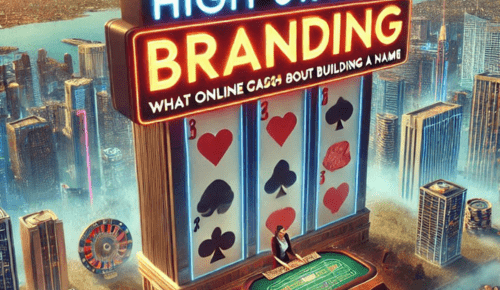In the fiercely competitive arena of online casinos, standing out can feel like playing a high-stakes game of poker. Each platform vies for user attention with flashy graphics, bigger bonuses, and promises of the next big jackpot. Yet, what truly separates a thriving casino from the countless others that fold within months? The answer: a strong, memorable brand that resonates with users—keeping them engaged, excited, and eager to come back.
This concept doesn’t just apply to gambling platforms. In an age of digital noise and infinite choice, every business, influencer, and entrepreneur is playing their own version of this high-stakes brand game. By understanding how online casinos craft compelling brand identities, businesses of all stripes can level up their own branding efforts and ultimately win big.
A World of Whirling Reels and Global Audiences
The global online gambling market has grown rapidly over the past decade. According to Grand View Research, it was valued at USD 57.54 billion in 2021 and is expected to expand at a compound annual growth rate (CAGR) of 11.7% from 2022 to 2030. With so many platforms chasing a slice of this multi-billion-dollar pie, brand differentiation isn’t just a luxury—it’s a survival strategy.
At the same time, player demographics are more diverse than ever. There are casual gamers who just want a few minutes of fun, high rollers seeking an adrenaline rush, and nostalgia-driven players searching for virtual versions of their favorite slot machines from the old days. Online casinos must craft brand stories that appeal to these disparate groups, forging emotional connections in a crowded digital marketplace.
Lesson 1: Authenticity Sells—Even in Virtual Worlds
One might assume online casinos rely solely on gimmicks and glitz to attract attention. While eye-catching visuals matter, the most successful casino brands go deeper, championing authenticity and fairness. Many casinos proudly display certifications from reputable regulatory bodies, conduct third-party audits, and highlight their transparent payout rates. Showing players that the odds aren’t secretly stacked against them fosters trust—an increasingly precious commodity in the digital age.
For any business, authenticity can be a game-changer. In a 2021 survey by Stackla, 88% of consumers said authenticity is important when deciding which brands they like and support. Like casinos, brands must back up their claims with real actions: demonstrate product quality, provide transparent policies, and solicit genuine customer feedback. Authenticity isn’t just a buzzword—it’s the foundation of long-term loyalty.
Lesson 2: Experiences Over Transactions
The best online casinos know they’re not just in the gambling business—they’re in the entertainment business. They differentiate themselves by offering immersive themes, interactive live-dealer experiences, and even virtual reality gaming sessions. Rather than focusing solely on payouts, they create a brand story that transports players to exotic locales, classic Vegas lounges, or fantastical worlds straight out of a Hollywood blockbuster.
This experiential branding isn’t lost on other industries. According to a 2020 Deloitte report, 84% of customers say the experience a company provides is as important as its products and services. For non-gaming businesses, this might mean hosting virtual product demos, creating interactive social media campaigns, or organizing engaging live events. When a brand invests in memorable experiences, customers stop seeing them as a mere vendor and start viewing them as a cultural touchstone.
Lesson 3: Personalization and Player Segmentation
In a massive field of competitors, smart online casinos use data to tailor experiences for individual players. Through analytics, they identify which games a user prefers, what times of day they log on, and which promotions resonate with them. Armed with these insights, casinos send personalized offers—perhaps free spins on a player’s favorite slot or a special tournament invite for frequent visitors. Personalization not only boosts engagement but also makes each player feel like a VIP guest.
This data-driven approach works beyond gaming. According to McKinsey & Company, personalization can reduce acquisition costs by as much as 50%, lift revenues by up to 15%, and increase marketing efficiency by up to 30%. Businesses can segment their customers by buying history, browsing patterns, or communication preferences. By delivering tailored messaging and products, brands show customers they’re seen as individuals, not just sales targets.
Lesson 4: Embrace Responsible Conduct for Brand Integrity
Online casinos walk a tightrope when it comes to ethical branding. They must balance the thrill of winning with responsible gaming measures. Many reputable sites incorporate self-exclusion tools, deposit limits, and direct links to gambling support organizations. They understand that brand integrity hinges on player well-being and that ignoring problem gambling risks serious reputational damage.
This lesson applies broadly. Customers now expect brands to behave ethically, from fair labor practices to eco-friendly policies. The 2021 Edelman Trust Barometer found that 86% of consumers expect CEOs to speak out on societal challenges. Just as casinos mitigate problem gambling concerns to preserve trust, companies in any sector can bolster their brand by openly addressing ethical concerns—be it environmental impact, data privacy, or supplier transparency.
Lesson 5: Influencer Allies and Community Building
In recent years, gambling Twitch streams and YouTube channels have exploded in popularity. Influencers who broadcast their gaming sessions—and occasionally their colossal wins or laughable losses—amass loyal followings. By partnering with such influencers, online casinos tap into engaged communities built on trust and shared interests.
This approach works for many types of brands. A 2020 survey by Influencer Marketing Hub found that the influencer marketing industry was set to grow to approximately USD 13.8 billion in 2021, reflecting its widespread success. By collaborating with influencers, brands can gain instant credibility and reach niche communities more effectively than any generic ad campaign could. It’s a strategy that resonates especially with younger, ad-weary demographics who crave authenticity and peer endorsement.
Lesson 6: Embrace Innovation and Evolving Trends
The online casino industry never stands still. From virtual reality slots to live dealers who greet players by name, innovations keep audiences intrigued. Some platforms are even experimenting with blockchain technology, offering provably fair games that let users verify odds on a public ledger. This constant evolution helps casinos stay ahead of competitors and maintain their brand as cutting-edge and player-focused.
In a volatile digital landscape, brands across all sectors must remain vigilant. Trends shift. Consumer habits evolve. A brand must be prepared to innovate continuously—whether through product features, marketing channels, or service delivery models. Much like casinos introducing new game variants, companies should pilot fresh ideas and embrace calculated risks to stay relevant.
Lesson 7: Global Outreach and Cultural Sensitivity
Many online casinos operate across multiple jurisdictions, tailoring payment options, languages, and customer support to local preferences. This localization strategy broadens their player base and signals respect for different cultures. Global casinos understand that a “one-size-fits-all” brand identity isn’t enough. They must adapt and fine-tune their image and messaging to resonate in distinct markets.
For other brands eyeing international expansion, the takeaway is clear: localize or lose. According to a 2020 CSA Research report, 76% of online shoppers prefer to buy products with information in their native language. Adopting local languages, partnering with regional influencers, and paying attention to cultural norms can transform a brand from an outsider to a welcomed neighbor.
The Jackpot: A Resilient, Resonant Brand Identity
Just like professional gamblers analyze odds and calculate pot odds, businesses should study how online casinos craft their brands. By embracing authenticity, providing immersive experiences, personalizing messaging, upholding ethical standards, forging influencer relationships, innovating relentlessly, and localizing for global audiences, brands can rise above the din of digital competition.
Online casinos thrive because they’ve mastered the art of brand differentiation in an industry where everyone promises big wins. They don’t just sell games; they sell an experience, a feeling, a community. And that’s a goal any brand—whether selling software, sneakers, or financial advice—should aspire to. After all, in the ever-shifting markets of the 21st century, a strong, authentic brand identity is the real jackpot.




